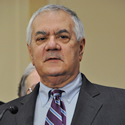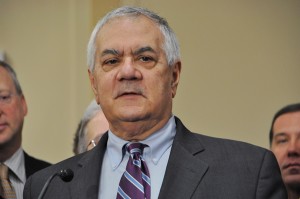National
ENDA makes debut in 112th Congress
Legislation introduced with 111 co-sponsors

Rep. Barney Frank (D-Mass.) on Wednesday formally introduced the Employment Non-Discrimination Act in the U.S. House with 111 co-sponsors, according to his office.
The 111 number, which includes three Republican co-sponsors, is nearly half the level of support that ENDA enjoyed at the close of the 111th Congress — when the legislation had 203 co-sponsors, the most ever for any pro-LGBT legislation — but Harry Gural, a Frank spokesperson, said the current number of supporters is “a terrific number considering huge loss of Democratic seats last November.” In the 111th Congress, ENDA had 117 original co-sponsors.
As it was introduced in the last Congress, ENDA would bar job discrimination against LGBT people in most situations in the public and private workforce. According to Frank’s office, job discrimination on the basis of sexual orientation is legal in 29 states and legal in 38 states on the basis of gender identity.
Media reports had earlier indicated that ENDA introduction was set for March 30. Although Frank, the longest-serving openly gay member of Congress, made an announcement on the legislation on that day, Gural at the time indicated his boss wanted to hold off on moving forward with the bill until it had more support.
Even though he’s the sponsor of the legislation, Frank has previously said he sees no chance of passing ENDA during the 112th Congress with Republicans in control of the House and that legislation would have to serve as an education tool until the “next time the Democrats take back the House of Representatives.”
Fred Sainz, vice president of communications for the Human Rights Campaign, said the introduction of ENDA is “a start and really nothing more than that.”
“The goal during the course of the next several months will be to work back up to a number [of co-sponsors] that is respectable with an even greater number of Republicans than we had last session,” Sainz said. “This number is obviously reflective of the huge losses that the Democratic caucus had as a result of the loss of the House.”
Sainz said the number of co-sponsors for ENDA “is merely one measure” to gauge progress for the legislation.
“A measure that is just as equally important is the amount of education and outreach that we do to members on both sides of the aisle because we have always known and acknowledged that this was a building year for ENDA,” he said.
Mara Keisling, executive director of the National Center for Transgender Equality, also said the introduction of ENDA paves the way to educate lawmakers on the issue of job discrimination against LGBT people.
“We’re going to spend this Congress just educating, educating, educating,” she said. “When we finally get to a place where we can have a vote, we’re going to be done, we’re going to be ready.”
In the 111th Congress, Sen. Jeff Merkley (D-Ore.) was the sponsor of a companion version of ENDA. His office didn’t respond on short notice to the Washington Blade’s request to comment on the timing for Senate introduction of ENDA.
U.S. Supreme Court
Supreme Court to consider bans on trans athletes in school sports
27 states have passed laws limiting participation in athletics programs

The U.S. Supreme Court on Thursday agreed to hear two cases involving transgender youth challenging bans prohibiting them from participating in school sports.
In Little v. Hecox, plaintiffs represented by the ACLU, Legal Voice, and the law firm Cooley are challenging Idaho’s 2020 ban, which requires sex testing to adjudicate questions of an athlete’s eligibility.
The 9th U.S. Circuit Court of Appeals described the process in a 2023 decision halting the policy’s enforcement pending an outcome in the litigation. The “sex dispute verification process, whereby any individual can ‘dispute’ the sex of any female student athlete in the state of Idaho,” the court wrote, would “require her to undergo intrusive medical procedures to verify her sex, including gynecological exams.”
In West Virginia v. B.P.J., Lambda Legal, the ACLU, the ACLU of West Virginia, and Cooley are representing a trans middle school student challenging the Mountain State’s 2021 ban on trans athletes.
The plaintiff was participating in cross country when the law was passed, taking puberty blockers that would have significantly reduced the chances that she could have a physiological advantage over cisgender peers.
“Like any other educational program, school athletic programs should be accessible for everyone regardless of their sex or transgender status,” said Joshua Block, senior counsel for the ACLU’s LGBTQ and HIV Project. “Trans kids play sports for the same reasons their peers do — to learn perseverance, dedication, teamwork, and to simply have fun with their friends,” Block said.
He added, “Categorically excluding kids from school sports just because they are transgender will only make our schools less safe and more hurtful places for all youth. We believe the lower courts were right to block these discriminatory laws, and we will continue to defend the freedom of all kids to play.”
“Our client just wants to play sports with her friends and peers,” said Lambda Legal Senior Counsel Tara Borelli. “Everyone understands the value of participating in team athletics, for fitness, leadership, socialization, and myriad other benefits.”
Borelli continued, “The U.S. Court of Appeals for the Fourth Circuit last April issued a thoughtful and thorough ruling allowing B.P.J. to continue participating in track events. That well-reasoned decision should stand the test of time, and we stand ready to defend it.”
Shortly after taking control of both legislative chambers, Republican members of Congress tried — unsuccessfully — to pass a national ban like those now enforced in 27 states since 2020.
Federal Government
UPenn erases Lia Thomas’s records as part of settlement with White House
University agreed to ban trans women from women’s sports teams

In a settlement with the Trump-Vance administration announced on Tuesday, the University of Pennsylvania will ban transgender athletes from competing and erase swimming records set by transgender former student Lia Thomas.
The U.S. Department of Education’s Office for Civil Rights found the university in violation of Title IX, the federal rights law barring sex based discrimination in educational institutions, by “permitting males to compete in women’s intercollegiate athletics and to occupy women-only intimate facilities.”
The statement issued by University of Pennsylvania President J. Larry Jameson highlighted how the law’s interpretation was changed substantially under President Donald Trump’s second term.
“The Department of Education OCR investigated the participation of one transgender athlete on the women’s swimming team three years ago, during the 2021-2022 swim season,” he wrote. “At that time, Penn was in compliance with NCAA eligibility rules and Title IX as then interpreted.”
Jameson continued, “Penn has always followed — and continues to follow — Title IX and the applicable policy of the NCAA regarding transgender athletes. NCAA eligibility rules changed in February 2025 with Executive Orders 14168 and 14201 and Penn will continue to adhere to these new rules.”
Writing that “we acknowledge that some student-athletes were disadvantaged by these rules” in place while Thomas was allowed to compete, the university president added, “We recognize this and will apologize to those who experienced a competitive disadvantage or experienced anxiety because of the policies in effect at the time.”
“Today’s resolution agreement with UPenn is yet another example of the Trump effect in action,” Education Secretary Linda McMahon said in a statement. “Thanks to the leadership of President Trump, UPenn has agreed both to apologize for its past Title IX violations and to ensure that women’s sports are protected at the university for future generations of female athletes.”
Under former President Joe Biden, the department’s Office of Civil Rights sought to protect against anti-LGBTQ discrimination in education, bringing investigations and enforcement actions in cases where school officials might, for example, require trans students to use restrooms and facilities consistent with their birth sex or fail to respond to peer harassment over their gender identity.
Much of the legal reasoning behind the Biden-Harris administration’s positions extended from the 2020 U.S. Supreme Court case Bostock v. Clayton County, which found that sex-based discrimination includes that which is based on sexual orientation or gender identity under Title VII rules covering employment practices.
The Trump-Vance administration last week put the state of California on notice that its trans athlete policies were, or once were, in violation of Title IX, which comes amid the ongoing battle with Maine over the same issue.
New York
Two teens shot steps from Stonewall Inn after NYC Pride parade
One of the victims remains in critical condition

On Sunday night, following the annual NYC Pride March, two girls were shot in Sheridan Square, feet away from the historic Stonewall Inn.
According to an NYPD report, the two girls, aged 16 and 17, were shot around 10:15 p.m. as Pride festivities began to wind down. The 16-year-old was struck in the head and, according to police sources, is said to be in critical condition, while the 17-year-old was said to be in stable condition.
The Washington Blade confirmed with the NYPD the details from the police reports and learned no arrests had been made as of noon Monday.
The shooting took place in the Greenwich Village neighborhood of Manhattan, mere feet away from the most famous gay bar in the city — if not the world — the Stonewall Inn. Earlier that day, hundreds of thousands of people marched down Christopher Street to celebrate 55 years of LGBTQ people standing up for their rights.
In June 1969, after police raided the Stonewall Inn, members of the LGBTQ community pushed back, sparking what became known as the Stonewall riots. Over the course of two days, LGBTQ New Yorkers protested the discriminatory policing of queer spaces across the city and mobilized to speak out — and throw bottles if need be — at officers attempting to suppress their existence.
The following year, LGBTQ people returned to the Stonewall Inn and marched through the same streets where queer New Yorkers had been arrested, marking the first “Gay Pride March” in history and declaring that LGBTQ people were not going anywhere.
New York State Assemblywoman Deborah Glick, whose district includes Greenwich Village, took to social media to comment on the shooting.
“After decades of peaceful Pride celebrations — this year gun fire and two people shot near the Stonewall Inn is a reminder that gun violence is everywhere,” the lesbian lawmaker said on X. “Guns are a problem despite the NRA BS.”
-

 Hungary4 days ago
Hungary4 days agoUpwards of 100K people march in Budapest Pride
-

 Theater5 days ago
Theater5 days ago‘Andy Warhol in Iran’ a charming look at intersection of art, politics
-

 Books5 days ago
Books5 days agoTwo new books on dining out LGBTQ-style
-

 U.S. Supreme Court4 hours ago
U.S. Supreme Court4 hours agoSupreme Court to consider bans on trans athletes in school sports








